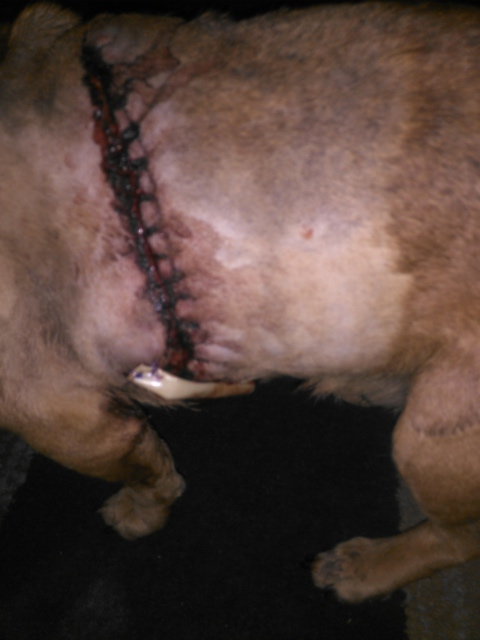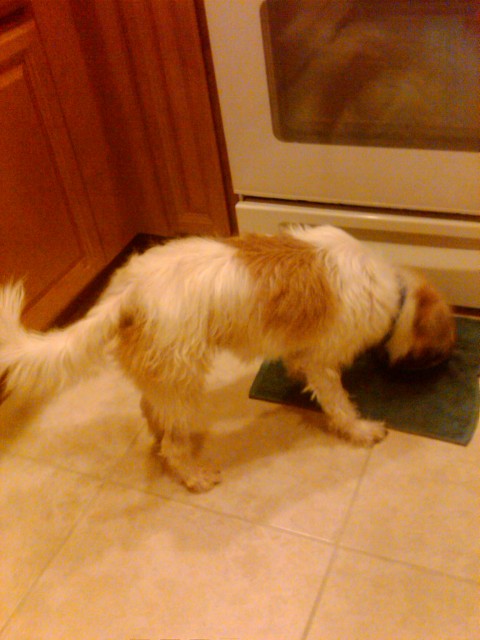QuestionHi Patti,
I have a 1 year old American Staffordshire Terrier who has a allergy to Grass. We tried allergy testing, immune booster shots and a few different medications. The only thing that helps which has worked incredibly and i highly reccomend is a daily dose of Colostrum and Vitamin C and a very fresh meat diet(No caned foods!) He is going great less itching and fur has almost grown back. He still chews away at his paws though and has random itchy spots especially after walks. I was wondering if you know of nay other supplements that would help that little bit extra. Thanks heaps. Reece
AnswerHi Leah,
Diet can control so many issues! But you didn't say if you're feeding your dog anything else besides meat. Dogs are not true carnivores, so they require some vegetable/fruit and carbohydrates (if your dog can handle grains) to have a balanced diet, and be healthy.
There are also several commercially produced dog foods these days that are 100% meat (from identified sources) which you might find more convenient than preparing all of your dog's meals. Brands you might consider are:
EVO Red Meat Large Bites
Wellness CORE
Evanger's All Meat Natural
Know Better Dog Food
Wysong Rabbit Au Jus 100% Meat
Did you clear giving your dog a daily Vitamin C supplement with your vet? Dogs manufacture all of the Vitamin C their bodies need. We humans can't manufacture Vitamin C in our bodies, so we require a supplemental dietary source. Feeding vitamin C to a healthy dog can affect that dog's liver the same as feeding thyroid medication would affect the healthy dog's thyroid gland. So, just be sure your vet is supervising the use of Vitamin C, and has given you a correct dose.
Dogs that are allergic to grass, are really allergic to grass pollen. The blades of grass will cause no harm to your dog. Because of this, many dogs are helped considerably by frequent bathing with a hypoallergenic shampoo (2-3 times a week). It has been demonstrated that some allergens may be absorbed through the skin. Frequent bathing is thought to reduce the amount of antigen exposure through this route. In addition to removing surface antigen, bathing alone will provide some temporary relief from itching. Some of the hypoallergenic shampoos incorporate fatty acids; these may be absorbed through the skin and offer a localized anti-inflammatory action. Colloidal oatmeal shampoos actually pulls inflammatory toxins out of the skin, generally giving 1-3 days of relief. They are available plain or combined with local anesthetic formulas to soothe itch. Brands to look for are: HyLyt Hypoallergenic Shampoo, Calm Coat EFA (Essential Fatty Acids) Shampoo, PetRelief Moisturizing Shampoo, and Veterinarian's Best Hypoallergenic Shampoo.
Colloidal oatmeal also comes in the form or a topical spray and lotion to help with the itching. Look for DVM Pharmaceuticals Relief Spray.
You can spray Witch Hazel on your dog's itchy areas to help sooth the itch.
Try 100% Aloe Vera gel (from a health food store). Products "containing Aloe" are much more available but are generally not as effective and not meant to be licked away by a pet. Aloe Vera gel contains enzymes which break down inflammatory proteins and enhance healing. Pure Aloe Vera gel is not harmful if your dog licks it off.
You can give your dog a fatty acid supplement. Fatty acids disrupt the production of inflammatory chemicals within the skin. They can be used in conjunction with an over the counter antihistamine to give an extra measure of itch control. 3V Capsules are favored by veterinary dermatologists as they contain a higher percentage of the fatty acids thought to be helpful. Other brands to look for are: DermCaps, Omega EFA capsules, and OmegaDerm.
As with other nutraceuticals, it takes 6-8 weeks of daily supplementation before the benefits of essential fatty acids might be seen. Not all dogs helped.
Ask your vet for an antihistamine recommendation, and correct dose. Dogs have individual reactions to antihistamines. Some dogs will respond better to one brand than another, so it's best to try more than one antihistamine before giving up on them to control itching. Some dogs will become drowsy when taking antihistamines. If this is unacceptable, they can not be used, or might be best to use at bedtime.
Some dogs with inhalant allergies can be helped by acupuncture. You can locate a veterinary acupuncturist here:
http://www.ivas.org/member_search.cfm
http://www.aava.org/php/aava_blog/aava-directory
Along with your regular vet, you might consider consulting with a holistic veterinarian. You can locate one here:
http://www.holisticvetlist.com/
http://www.theavh.org/referral/index.php
With any luck, this is just a seasonal problem for your dog!
Best of luck,
Patti

 Puppy hates being alone.
Question
Me and Toby
Our jack russel is extremely cuddl
Puppy hates being alone.
Question
Me and Toby
Our jack russel is extremely cuddl
 tumor on my dog
Question
stitched up second tim tumor
My d
tumor on my dog
Question
stitched up second tim tumor
My d
 new puppy
Question
bella
I adopted a puppy from the humane
new puppy
Question
bella
I adopted a puppy from the humane
 old age dog
Question
he was barking!
I have a Dog who is a german s
old age dog
Question
he was barking!
I have a Dog who is a german s
 How do I groom my mixed breed terrier?
Question
Oliver
Hi Susan!
I recently rescued a wonderfu
How do I groom my mixed breed terrier?
Question
Oliver
Hi Susan!
I recently rescued a wonderfu